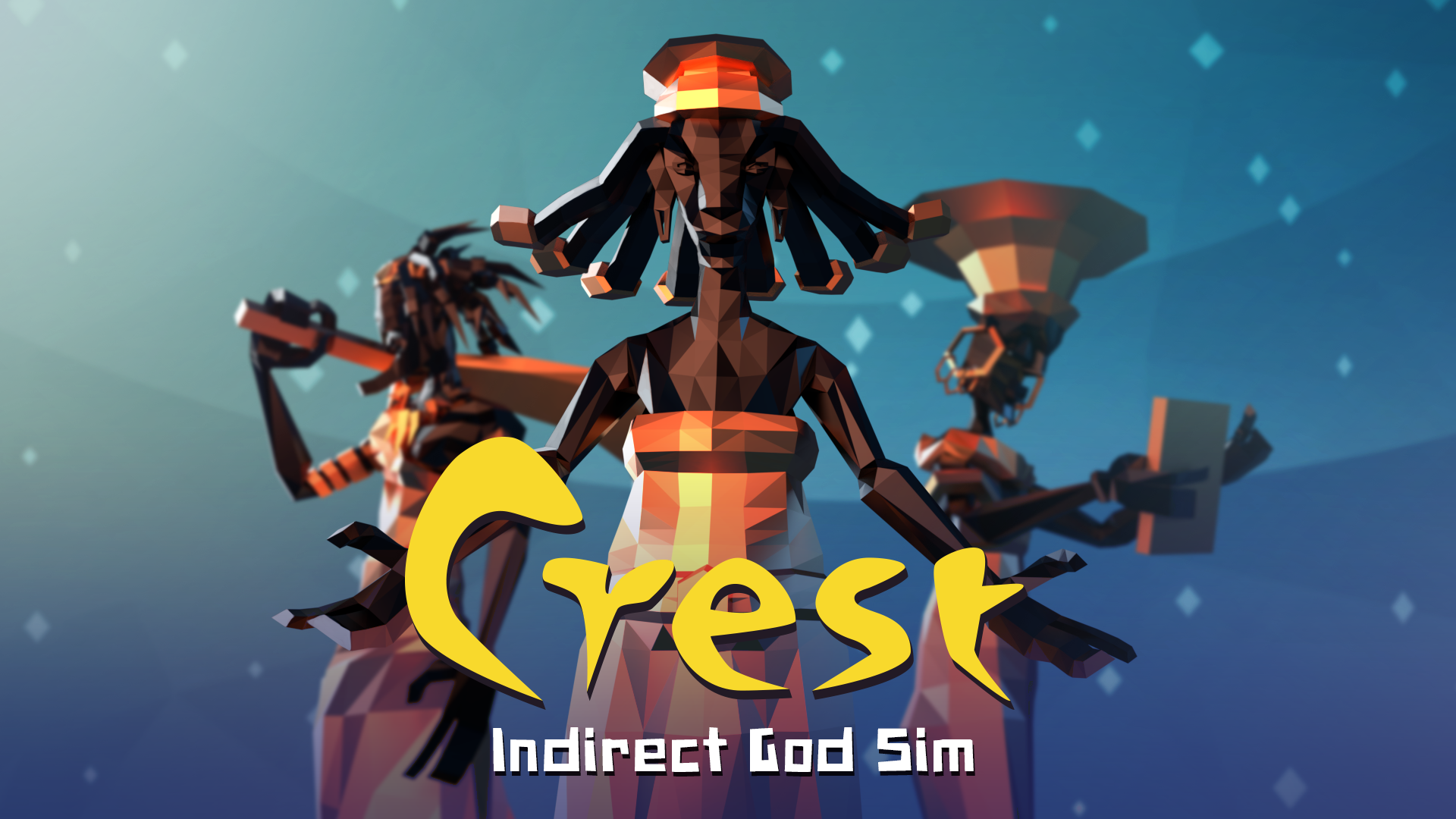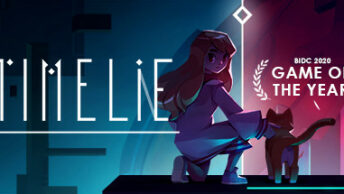Crest is an indirect god game that tempts you with the tree of knowledge, but hands you only a small twig instead.
Type: Single-player
Genre: God Game, Sim
Developer: Eat Create Sleep
Publisher: Eat Create Sleep
Release date: 8 Mar, 2018


Crest lets you indulge your sacrilegious god-lust, by lording over a world of pet humans and dictating their sad and miserable lives solely through the power of your transcendent word; however, the literary limitations of this game may soon leave you theologically tongue-tied.
Crest grants you, as an infallible supreme being, a series of small islands populated with an equally small number of villagers, your goal being to encourage them to fruitfully multiply, eventually spreading across the whole visible map until they squander the resources and all life dies a slow and drought-stricken death. Either your followers are inept, or you’re just lousy at god-ing, but that’s generally the trajectory of most games during your reign in Crest.
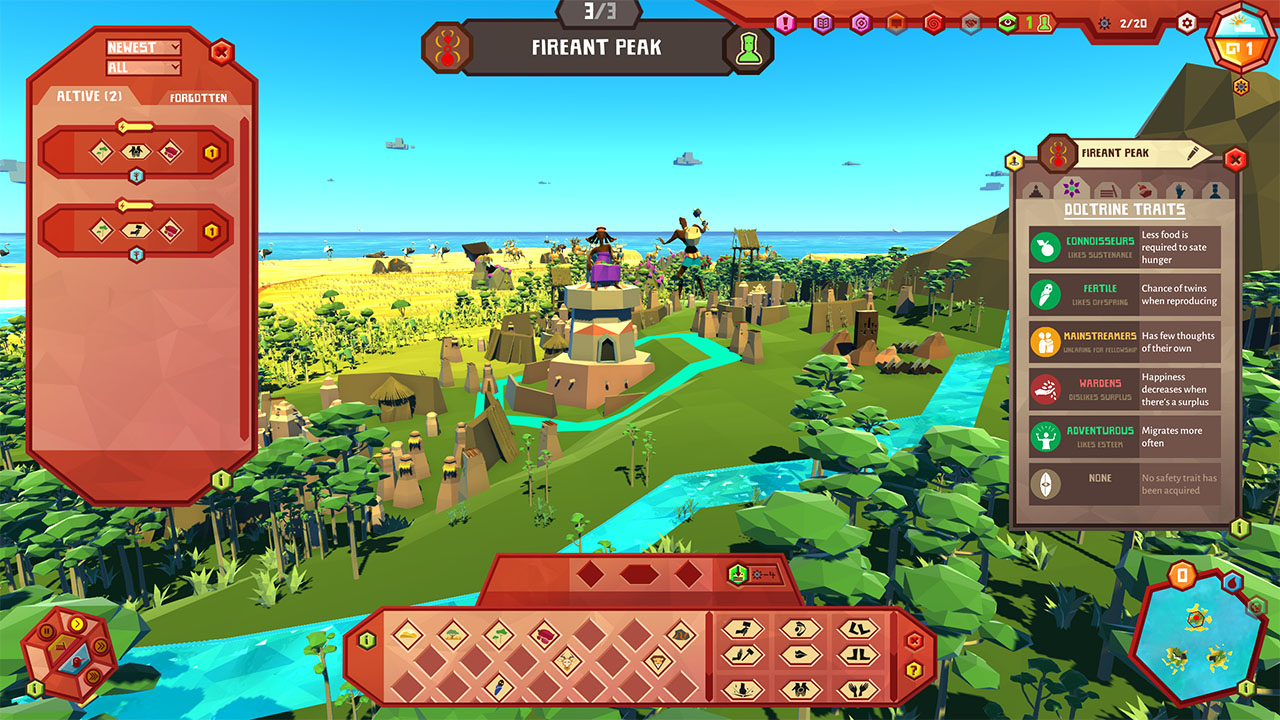
“I was hunting antelopes, when I recognized that death surrounds us.”
The twist in this god-game is that it’s “indirect”, you don’t explicitly control the actions of your people or cities, rather you influence their behavior by making commandments that they may, or may not, choose to follow. Gameplay consists exclusively of constructing commandments that tell followers to hunt, gather, mine, trade, fight, or migrate by forming sentences out of a handful of words. Each city has goals, likes, dislikes, and each person has wants and needs as well, so to gain the most Faith you need to tailor your proclamations to the desires and whims of your feckless populace. All the while you must contend with the passage of time, seasonal cycles, water usage, terraforming, over-farming, over-hunting, and the general balance of the eco-system.
Your biggest challenge, aside from an exceedingly tiny vocabulary, is the risk that your followers will misinterpret your commandments and do something completely unexpected. Moreover, they may pick up bad habits by associating positive words with negative outcomes, and vice versa, causing them to react poorly to your directives. The gimmick here is that depending on how faithful each follower is, they are more or less likely to take your word literally, and this is paired with an internal system where they learn word associations based on their individual life experiences, all of which leads to humorous “story” screens that show their misguided attempts at understanding the world.
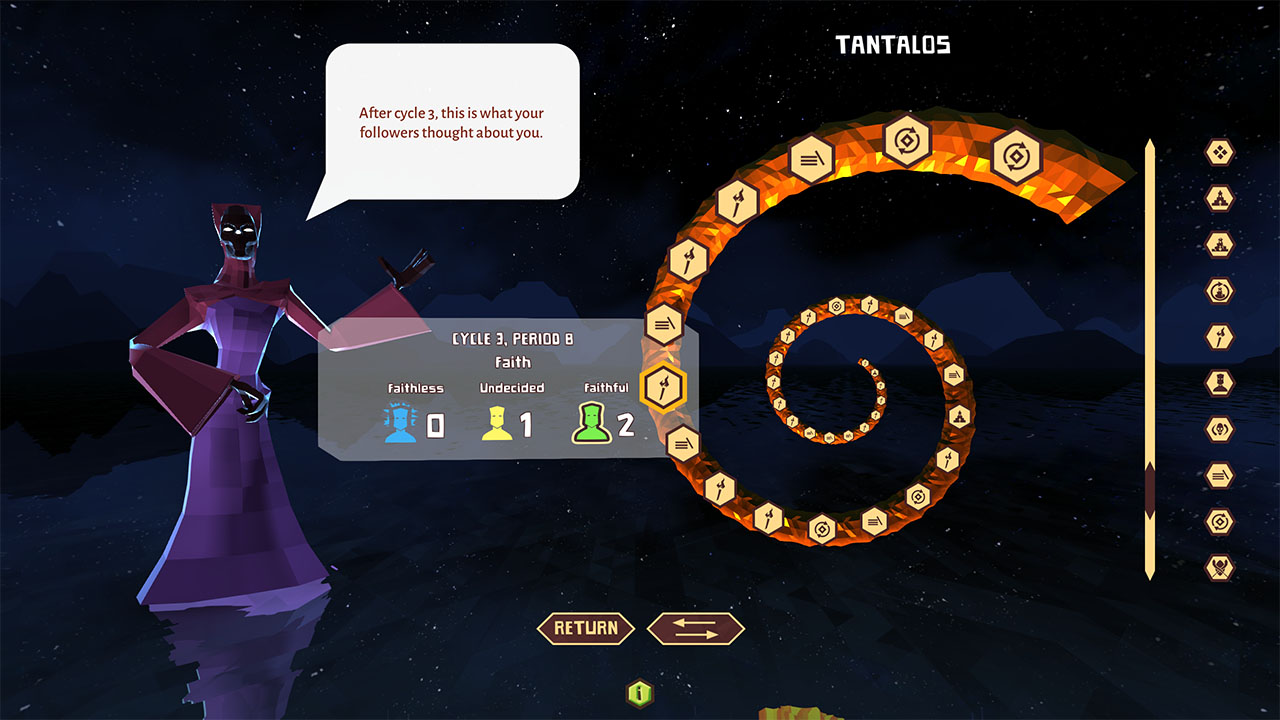
Provided your humans live long enough, you can complete quests called “Teachings”, which are unlocked when the unwashed masses achieve various quotas. Completing a Teaching goal gives you Wisdom points which can be spent on a skill-tree (the Book of Learning) that grants new words to use in your sacred tomes. You can check the success of previous proclamations by visiting the Chronicler who will unfurl a rather mesmerizing vortex of history that neatly catalogues your past failures.
Each NPC in the game is a unique individual that you can name and track, not only through their entire fruitless life, but even after they die from hunger (or lion attack), and as you visit the underworld all the souls of those who lived above stand in a long line to have one final chat with you about their meaningless existence. It’s a nice sentimental touch, even if the encounter isn’t entirely edifying; they rarely tell you anything you didn’t already know (such as the aforementioned lion attacks). There are other things tossed into the mix in an attempt to bulk out the gameplay, such as monuments, festivals, outbreaks of rabid man-eating ostriches…things that are momentarily interesting, but then become nothing more than a blip in the eventual downward spiral that is your world.
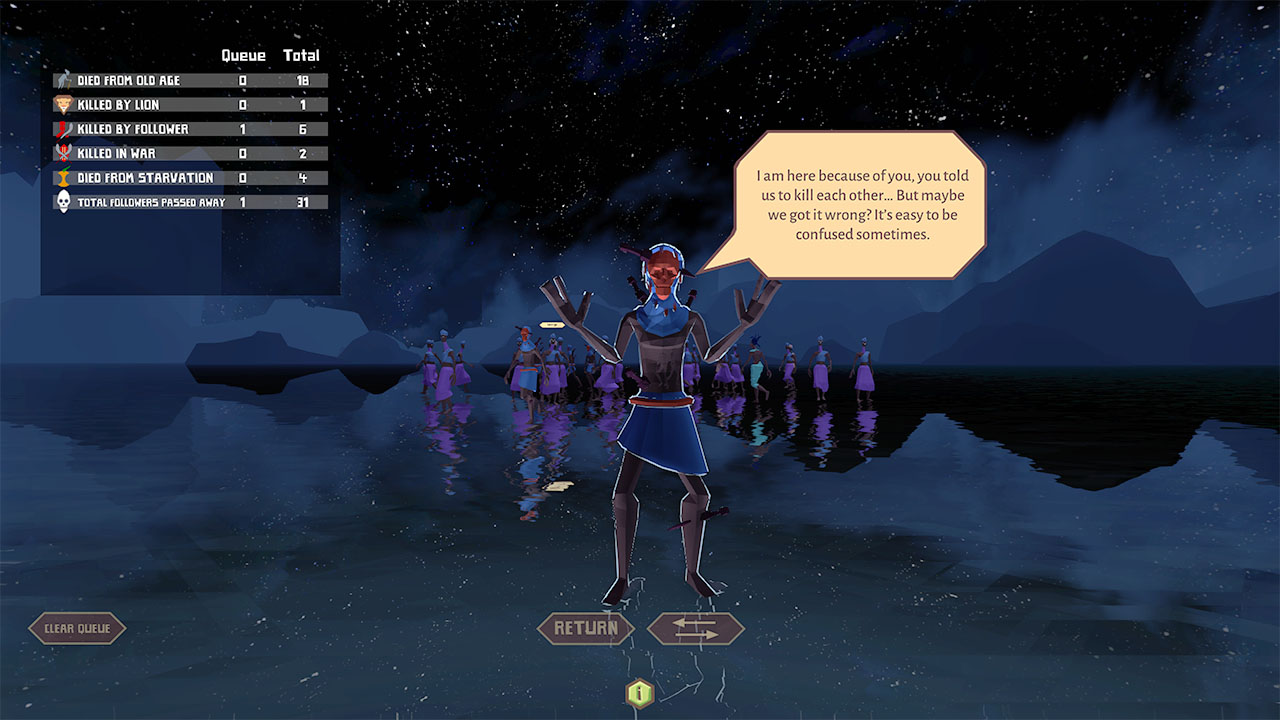
“I was wandering the jungle,
when I got a feeling that fishing is kind of fun.”
I specifically went into Crest looking forward to the “indirect” playstyle, as I was very eager to get a break from the minutia of micromanaging populations, cities and armies such as in other sims, but the results here are indirectly passive to such an extreme level that it renders the player as the most impotent deity in god-gaming history.
At times, Crest feels more like a virtual ant farm than an actual game. You spend more time just watching little lives go about their pointless existence than you do interacting with them. Your only interaction, in fact, is to make commandments; that’s it, there are no other activities or tasks; you can only send commands to humans, you have no say over animals, plants, the weather, or anything else that a normal god would be able to control. Furthermore you can only issue commands when you’ve accrued enough faith, which, depending on your population at the time, might take a few cycles, and in the meanwhile there is literally nothing else to do but stare at stat screens. The gameplay might be simple, but it’s also simplistic, and feels antagonistically one-dimensional despite any attempt by the player to bring strategy, tactics, or immersion into it.
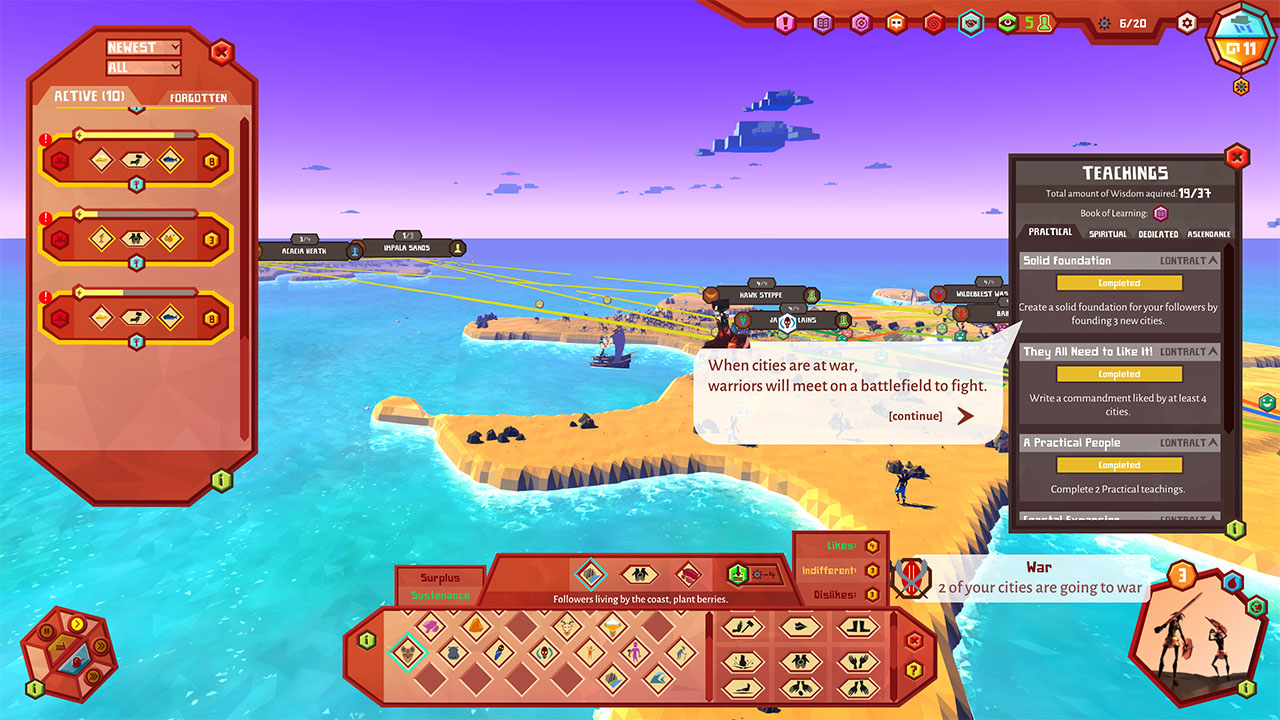
The overly random nature of the game works against any enjoyment that could otherwise have been harvested from the little pagan sprites praying for salvation beneath your hallowed cursor. For example, the small set of starter words you are given at the beginning is randomly chosen, the words available on the wisdom tree are random, the associations your followers make are random, the outcomes of your policies are random, how commands are re-interpreted is random, the “quests” in the Teaching panel are random, and most of the major world events are random. There’s so much randomness, that it’s hard to get a bearing from one game to the next, and even more puzzling if you’re trying to form a cohesive strategy. Some of the randomness wouldn’t be so bad, if it at least followed logic; but even that is random.
Take for instance the wisdom tree; in most games a tree like this progresses from the least to the most powerful skill, unlocking things in a logical order as each branch along the path relates in some way. In Crest, the items and order of the elements along the tree are randomly generated when you first start a new game, and their placement bears no logic to one another. In one game, in order to unlock “Mining”, I had to first unlock “Death”. In another, I was able to unlock “Young” and “Middle-aged” easily, but to unlock “Old” I had to first go through “Hippos”. Existential navel-gazing aside, I’m not sure what death has to do with mining, or hippos with the elderly. Perhaps there’s a Far-Side comic I missed that explains this.
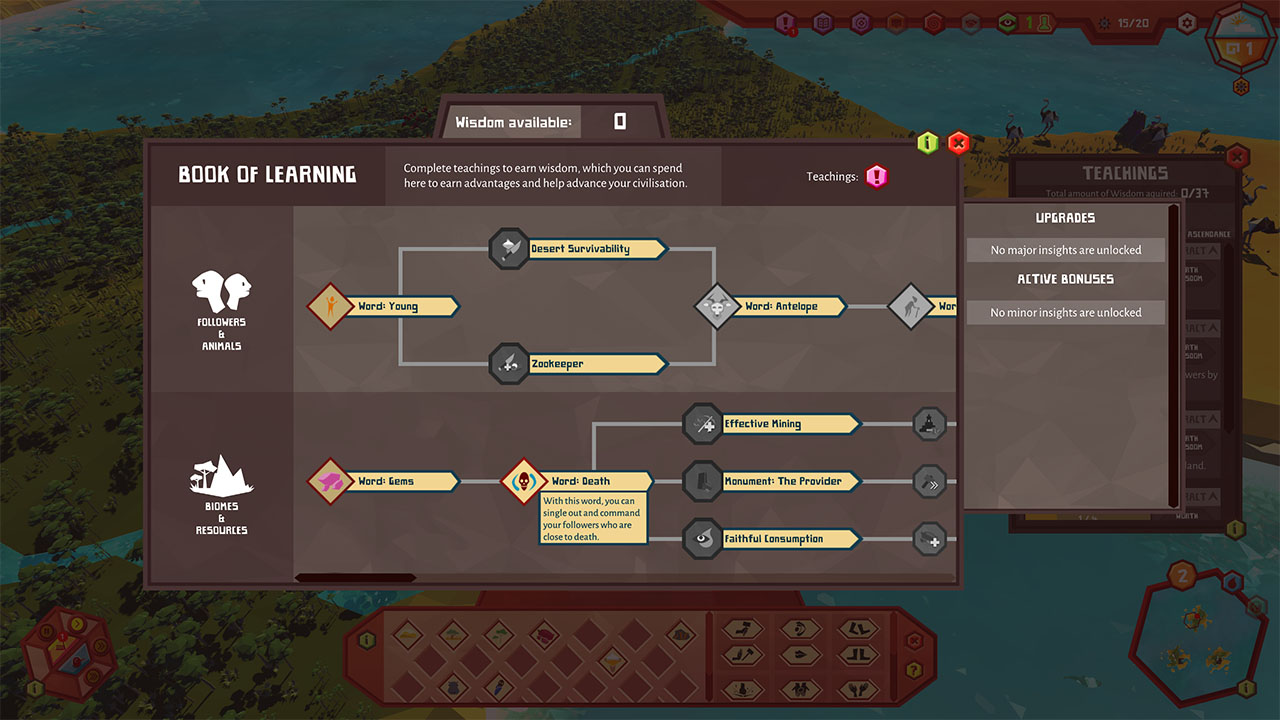
There are also no overarching goals, trajectories, or progression to this game. Your followers don’t develop beyond being hunters and gatherers, their villages never evolve past a few grass huts, and the physical world is so tiny that there’s no exploration to urge you deeper into the unknown. The lack of any sort of timeline makes it rather difficult to judge how successful one playthrough is compared to another, as there are no milestones to keep track of, or metrics by which to gauge your progress. All of this amounts to a game that, though open-ended, has very little actual replay value. Play the game once and it might amuse you; play it twice and it will start to feel like a re-run; any more than that and it’s overbearingly repetitive.
“I was finishing up my sixth meal of the day,
when someone told me that food was becoming a problem.”
Of all the false idols and mis-steps of this game, the biggest is that the developers chose to focus on the mundane over the moral. If the game wants to present an alternate take on god-games by being “indirect”, then why do all the commands stress such direct things as: eat, migrate, reproduce, and gather? All of the commandments in the game are geared towards pragmatic survival skills, so when your followers re-interpret the commands, the outcomes are predictable, obvious, and very, very practical. So much so that it begs the question of why bother with an “indirect” mechanic at all, and just opt for a regular god-game instead?
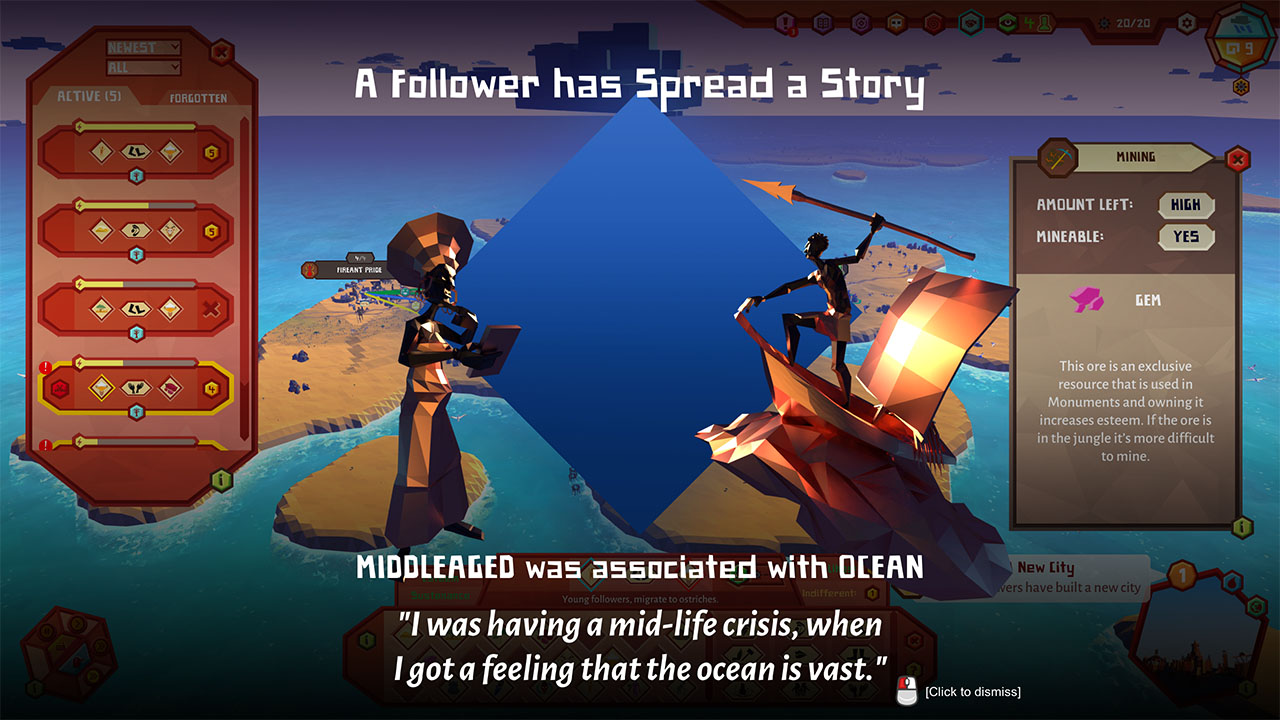
Telling a follower to eat berries, and watching them mis-interpret that as eat ostriches isn’t a terribly creative or rewarding outcome from a gameplay standpoint, because it’s just swapping x for y; no meaningful changes in the environment or the follower’s behavior result from your proclamations other than maintaining their material needs, and the only thing really guiding that is a simplified Maslow’s pyramid, which is all well and good, but also terribly dry and left-brained. Being a god should be about creating, but there’s nothing creative in this wheel of life.
Had the game based its commandments around morality instead, it would have been much more surprising to see the interpreted by your followers. Let them take care of the day-to-day minutia of feeding and trading…what I want to play with is their beliefs, and see how that affects the lives on this tiny planet: vilify non-believers, embrace violence, encourage sloth, foster altruism, seek pacifism, praise vanity. That would have made for a much more interesting, unexpected and narratively involving journey as a god, and certainly would have worked much better with the “indirect” model of gameplay than simply blurting out followers who live by the coast, eat lions, which is an actual example of the game’s diction. What kind of commandment is that? It sounds about as creative as the instruction manual from a box of flatpack furniture.
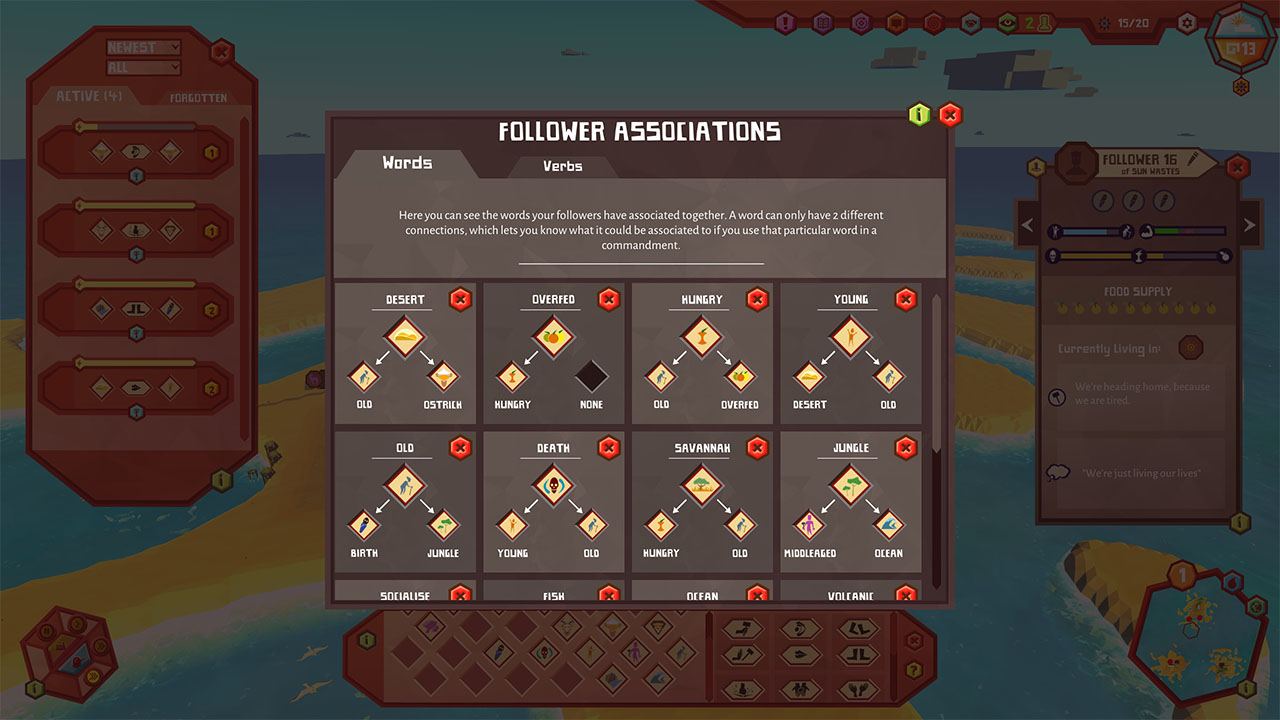
Despite the limitations of Crest, the internal mechanics are still praiseworthy; it may not be a fun game, but it’s impressively made. You can highlight a single person on the map and a stat window will show their health, hunger, age, reproductive rate, goals and mood; it’s occasionally nice to just sit back and watch a person’s life unfold, from beginning to end, as a passive observer; all the variables that contribute to their life from the outside world alter the trajectory of their existence and you can see the direct cause-and-effect of these factors reflected in their stats. This level of detail is a sight to behold, even though the voyeuristic experience of following a virtual human’s life is surprisingly shallow. Crest is just so passive, it’s hard to care about anything or anyone, even when you’re following them cradle-to-grave.
“I was evading hippos,
when I came to the conclusion that the savanna is a great place to relax.”
These criticisms are made even more heartbreaking because the rest of the game is exceptionally well polished. The character designs and graphics have a charmingly stylized chunkiness to them that is both comical and endearing. The use of color is dazzling, and makes for some nice sunset scenes as you gaze drowsily down on your people below. The UI and stat screens are elegantly handled, and the overall art-direction is palpably top-notch. The animations and event graphics are nicely executed and bring a lot of personality to the otherwise dry material. The sounds and music are excellent as well. A simple rule. if in-game music is working for me, is whether or not it pops into my head when I’m not playing. In this case I definitely had these tunes stuck in my mind throughout the day, so I applaud the choice of soundtracks, which is thankfully also available as a DLC, and is recommended. From an aesthetic standpoint, everything about this game demonstrates such wonderful artistry that it’s quite frustrating to see rest of the title devolve into such dullness. How can something that looks and plays this well be so lifeless?
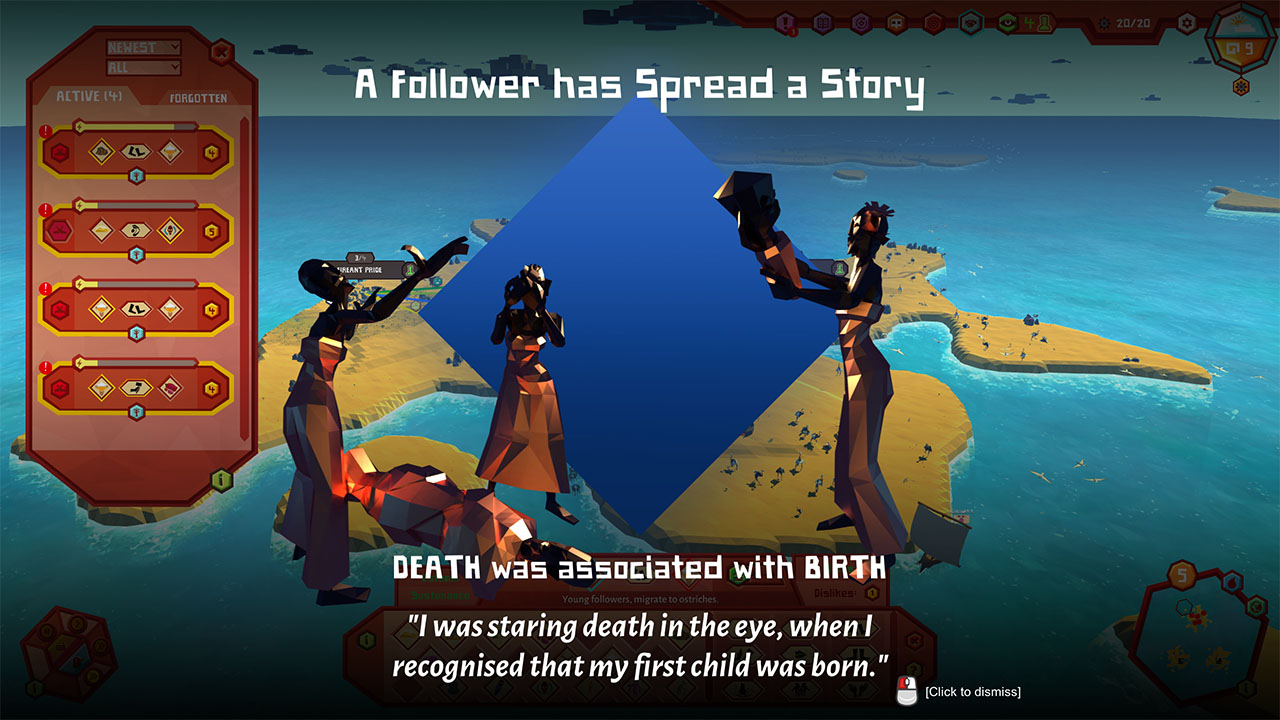
“I was looking for something to eat, when I heard that everyone gets old.”
It’s worth noting that this game originally came out in March 2018 and has recently been relaunched by developers Eat Create Sleep after adding new features and improvements which supposedly build upon the initial release. Since I’ve not played the original version, I cannot compare the new additions, but I at least give them credit for actively making changes to enhance the game. Despite its many shortcomings, Crest is highly polished, and if taken in small doses, is a relatively good value for its modest price. You may not get hours and hours of play out of it, and you certainly won’t be hankering for “just one more turn”, but it’s inexpensive, easy to learn, and makes for a benign, if unengaging, divine distraction.
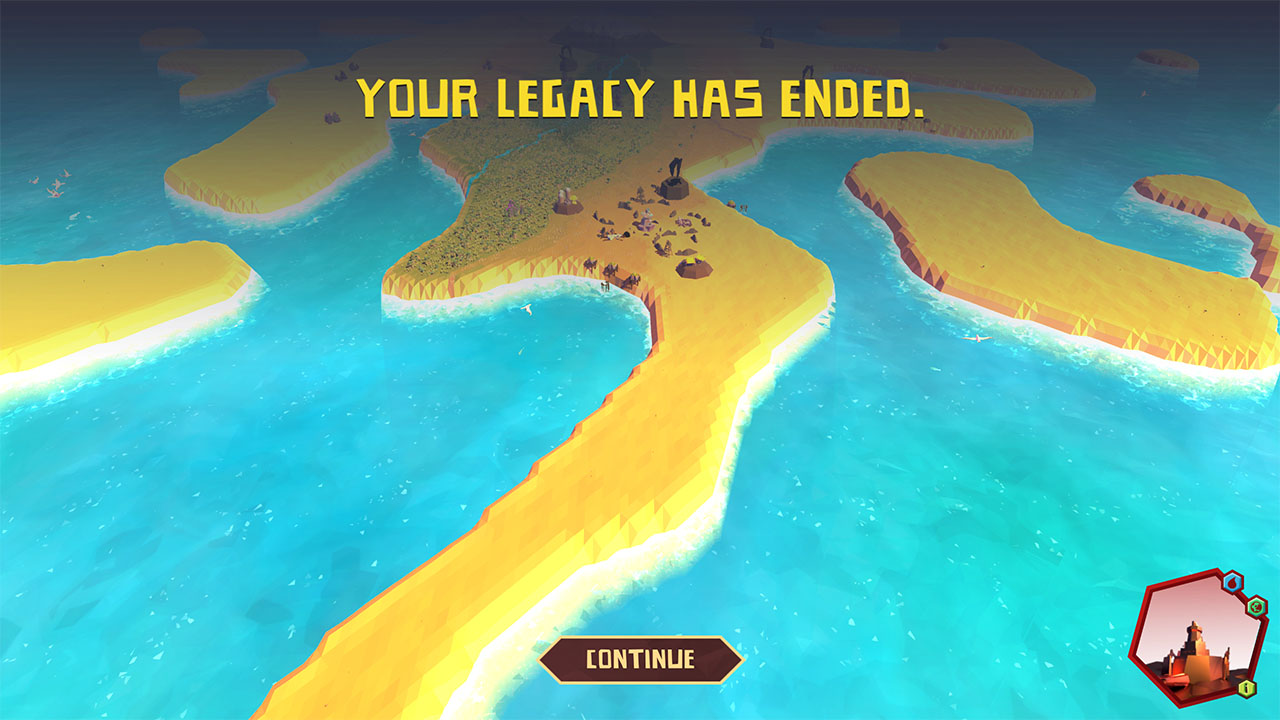
Verdict
I really admire Crest. But for a game that’s all about word associations, I have a hard time associating admiration with fun, and the simple truth is that my time with it was not fun; it was neither enjoyable nor unenjoyable, just pervasively and vaguely indifferent. Ultimately, it’s a really interesting idea that is in desperate search of an equally interesting game. In an attempt to carry forward the torch of the god-gaming genre, Crest sadly stumbles with little more than a tiny flicker of light.

